Telekom Malaysia and MEASAT Broadcast Network Systems Sdn Bhd (Astro) have announced a collaboration to enable Astro to offer high-quality digital experience to all Malaysians. Through this partnership, Astro can tap on TM’s high-speed broadband (HSBB) network, bandwidth, backhaul, and internet access through TM’s wholesale business.
According to Astro CEO Henry Tan, the strategic partnership with TM lays the foundation for Astro to be an internet service provider. He added “Astro’s goal is to provide Malaysians with the best digital experience and broadband value proposition. Leveraging on the strength of TM’s wide HSBB network will enable Astro to realise new revenue streams, scaling our broadband service with content bundles, or standalone broadband and other product lines.”
Through TM’s HSBB network, Astro can provide broadband service to its customers without having to build its own fibre infrastructure. This will give the pay TV company immediate access to a wide area of fibre coverage throughout the country, allowing them to offer high-speed broadband connectivity and comprehensive solution to its customers.
Before this, Astro has been providing broadband and pay TV bundles in partnership with Maxis and TNB’s Allo. At the moment, they are offering Astro & Broadband bundles from RM99. By working directly with TM, Astro says it will give them the flexibility to offer great value and convenience to its customers.
In addition to broadband service, TM is also providing Astro with its Content Delivery Network (TM CDN), a newly developed content platform that is designed to deliver seamless, faster and secure digital content. TM CDN will enable Astro to strengthen its video streaming efficiency to its current service offering.
Recently, Astro has been slowly transitioning from satellite to IP-based streaming for its video content. Besides partnering with video streaming providers such as Disney+ Hotstar and Netflix, they have also introduced its Astro Ultra Plug & Play offering which does not require a satellite dish. Existing Astro Ultra users are also given the option to stream content via the internet if satellite service is disrupted.
Commenting on the collaboration, TM Group CEO Imri Mokhtar said “TM as the leading infrastructure partner for High-Speed Broadband wholesale services, leveraged its superior network nationwide to support the industry’s broadband growth. We are also the primary mobile backhaul infrastructure provider for the industry with extensive coverage and capacity. As the digital infrastructure accelerator in Malaysia, we have always been a strong advocate of infrastructure sharing. Thus we are honoured to be given this opportunity to leverage each other’s expertise to provide Malaysians with high-quality broadband and content services that we have.”



































 (@fahmi_fadzil)
(@fahmi_fadzil) 

